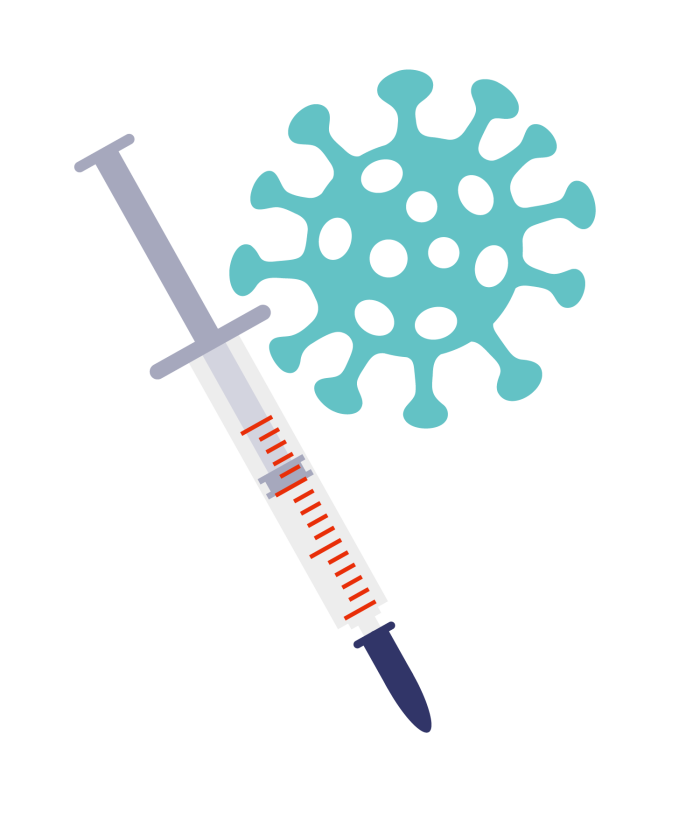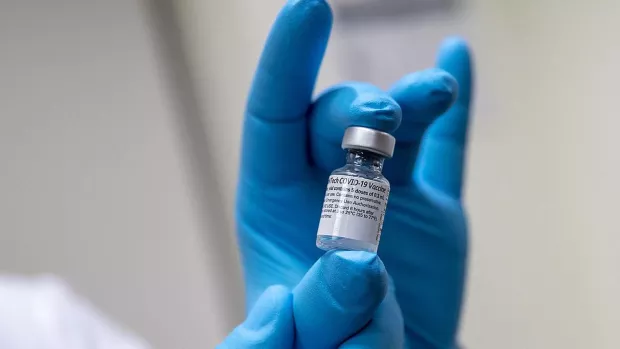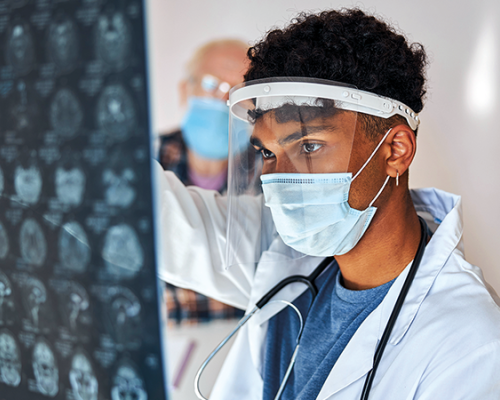
MS and the COVID-19 vaccines
Can I get a COVID-19 booster vaccine? Are the coronavirus vaccines made by Pfizer-BioNTech, Oxford-AstraZeneca or Moderna "live" vaccines?
We’ve spoken to leading healthcare professionals to help answer your questions about COVID-19 vaccines and MS.
Your own MS team can give you more advice based on your circumstances, treatments, and whether getting a COVID-19 vaccine is right for you.
We updated this page on Tuesday 19 March 2024 with an update on the spring 2024 booster campaign across the UK.
- When can I get a COVID-19 vaccine?
- Is it too late to get the COVID-19 vaccine?
- Do I need a “third primary dose” of the COVID-19 vaccine?
- Can I get I get the spring 2024 COVID vaccine booster?
- Can children and teenagers get the COVID-19 vaccine?
- Can I have a COVID-19 vaccine if I'm having an MS relapse or take steroids?
- Will a COVID-19 vaccine interfere with my other medications?
- What about COVID-19 vaccine side effects?
- Are the coronavirus vaccines ‘live’ vaccines?
- Which COVID-19 vaccine is best for someone with MS?
- Can I get the COVID-19 vaccine if I’m pregnant?
- How do the COVID-19 vaccines work?
- Do any of the COVID-19 vaccines contain egg or animal products?
- Have the COVID-19 vaccines been tested in people with MS?
- How do we know that the COVID-19 vaccine will be safe and effective for people with MS?
1. When can I get a COVID-19 vaccine?
COVID-19 vaccines are available across the UK to anyone aged 5 or over, including people with MS, their family, friends and carers.
Everyone with MS is eligible for two doses of the COVID-19 vaccine, and booster jabs after that when they’re recommended. Some people will be advised to have a “third primary dose” as well as boosters.
Some people with MS will be offered an autumn 2023 COVID vaccine booster.
DMTs and COVID-19 vaccines
Some disease modifying therapies (DMTs) might affect the timing of COVID jabs. Read more about DMTs and COVID-19 vaccines
Vaccination centres and home vaccination
The NHS has asked all vaccination sites to be accessible with reasonable adjustments such as priority lanes for anyone who finds it hard to queue.
If your MS means you can’t get to a centre for your jabs, your GP or local NHS should arrange it at home.
Avoid the scammers
If the NHS gets in touch to arrange your vaccine it could be by phone, letter or both. A genuine contact from the NHS won’t ask for payment or for you to send personal documents to prove your identity.
2. Is it too late to get the COVID-19 vaccine?
It’s not too late to get your COVID-19 vaccine. Most people had two “primary doses” (the first two doses) in summer 2021. But if you haven’t had these, you can still get them wherever you are in the UK. It’s now on offer to anyone over the age of five.
You might also be eligible for a “third primary dose” and booster jabs.
Find out about booking COVID-19 jabs in your nation
3. Do I need a “third primary dose” of the COVID-19 vaccine?
You might be advised to have a "third primary dose" if you took the following DMTs around the time of your COVID-19 vaccine:
- Ocrelizumab
- Rituximab
- Fingolimod
- Siponimod
- Ozanimod
That’s because these DMTs might have stopped your immune system from responding strongly enough to the first two vaccine doses.
You can have your third primary dose as soon as 28 days after your second dose.
If you haven’t yet heard about getting a third primary dose and you take one of those DMTs, contact your neurologist to discuss it.
Am I immunosuppressed?
The government vaccine advisers (the JCVI) recommend the third primary dose for people who are ‘immunosuppressed’ or with a “weakened immune system”. Having MS itself doesn’t mean you’ll have a weakened immune system. But the DMTs above might have that effect, for varying lengths of time.
Read more about DMTs and COVID-19 vaccines
4. Can I get the spring 2024 COVID vaccine booster?
You might be able to get a COVID-19 vaccine booster this spring. Across the UK they’re being offered to:
- people aged 75 and over
- care home residents
- people with a 'weakened immune system'
Having MS doesn’t mean you’ll have a weakened immune system. But some disease modifying therapies (DMTs) or recent steroid treatment might affect how your body can fight off infections including COVID-19, or affect the protection the vaccine offers.
Read what our medical advisers say about different DMTs and COVID vaccines
The spring 2024 boosters start being given in April, but might take some months to be offered to everyone eligible. You’ll usually be invited around 6 months after your last dose, but you can have it after only 3 months.
The NHS should contact you if you’re eligible for this spring 2024 booster. If you’re not contacted by the NHS but think you’re eligible, each nation has NHS or government information about the process for winter vaccines.
You might need to contact your GP or neurology team if you don’t hear from the NHS. Online and telephone booking isn’t set up in all nations.
Find out about COVID-19 vaccines in England
Find out about winter vaccines in Scotland
Find out about COVID-19 vaccines in Wales
Find out about COVID-19 vaccines in Northern Ireland
5. Can children and teenagers get the COVID-19 vaccine?
Across the UK, children aged 5 and over can get the COVID-19 vaccine. Some older children might also be recommended booster jabs.
Check who’s eligible and how to book COVID-19 jabs in your nation
Can children with MS get the COVID-19 vaccine?
Children with MS can now get the COVID-19 vaccine along with everyone else.
Some children as young as 6 months can be offered the vaccine. The NHS should get in touch with anyone eligible.
We agree with an MS International Federation recommendation that young people with MS should be offered the vaccine.
Read the MS International Federation information about vaccines for young people with MS
6. Can I have a COVID-19 vaccine if I'm having an MS relapse or take steroids?
Our medical advisers recommend not having the vaccination while you're having a relapse.
They also advise waiting two weeks after completing a course of steroids to treat a relapse, before being vaccinated.
7. Will a COVID-19 vaccine interfere with my other medications?
Our medical advisers say you should wait two weeks after completing a course of steroids to treat a relapse, before being vaccinated.
Our medical advisers don’t think the COVID-19 vaccine will stop DMTs from working. They say this because of what we know about the way these vaccines work, and evidence from studies of other vaccines and MS. At the moment, we’re not sure if a COVID-19 vaccine will interfere with any other medications you might be taking.
No one should stop their MS therapy unless specifically requested to do so by their MS team.
Read our medical advisers' consensus statement on DMTs and COVID vaccines
Your MS team can answer specific questions about your own circumstances.
8. Does the COVID-19 vaccine work against the Omicron variant?
Current vaccines can give protection against Omicron, as well as the protection they offer already against other variants.
At the announcement about the new Omicron variant in late 2021, government medical advisers encouraged everyone to get vaccinated against COVID-19 with the vaccines on offer.
And because of the Omicron variant of the virus, the UK government advisers sped up that booster programme. They also confirmed that people having a “third primary dose” of the vaccine would also be offered booster jabs.
Two new versions of vaccines have been developed specifically for Omicron as well as the original COVID-19 variant. They've been approved by the UK Government for the autumn 2022 booster campaign, alongside the existing vaccines. These new versions work in similar ways to the original vaccines. So they're likely to have similar effectiveness to the originals for people who are immunosuppressed.
9. What about COVID-19 vaccine side effects?
Some people report no side effects at all from COVID-19 vaccines.
When people do notice something, the most common reactions are headaches, arm pain, body aches, chills or fever lasting a few hours to a few days. Over-the-counter painkillers, like paracetamol, can help with this.
Some of the possible side effects are similar to MS symptoms, including tiredness and muscle pain. A fever can make your MS symptoms worse temporarily, but they should return to how they were, after the fever is gone. But if you’re worried about any symptoms, you should contact your doctor or MS team as you usually would.
We know about these possible side effects because thousands of people taking the vaccines were monitored during the clinical trials. And when people report new side effects to a doctor or nurse (or use the Yellow Card scheme) this is recorded and the information about the vaccine is updated. That way, there’s ongoing monitoring for side effects in the months and years after the vaccine is given.
We also have information from the MS Register, where people with MS have answered questions about vaccine side effects they might have noticed.
Read more about the MS Register survey of vaccine side effects
Because none of the licensed vaccines are "live vaccines"it’s impossible to catch the coronavirus from the vaccine.
Oxford-AstraZeneca for the under 40s
On 7 April 2021, the government vaccine advisers (the JCVI) announced new advice for people aged 18-30 who don’t have an underlying condition (such as MS). On 7 May this was extended to people up to the age of 39. This could include family, partners or carers of people with MS.
If these people are going for their first jab, they should be offered an alternative to the Oxford-AstraZeneca vaccine, when possible.
This is because of extremely rare side effects of blood clots.
If you’re due for your second Oxford-AstraZeneca jab, the JCVI says you should still have it, even if you’re under 40 and have no underlying conditions. There have been very few cases of blood clots reported after the second jab.
The chances of having a blood clot after the AstraZeneca vaccine are very small, and a link between the vaccine and the blood clots hasn’t been proven. But they’ve been reported in about 10 people in every 1 million who’ve had this vaccine.
The JCVI has not given the new advice for people under 40 because they are likely to develop blood clots. They are taking a very cautious approach and weighing up the small risk of blood clots against the benefits of taking the vaccine.
For people with underlying conditions, they say the benefits of the vaccine outweigh the risk.
People under 40 without underlying conditions are less at risk from COVID-19 complications. So the JCVI has decided that at the moment they should be offered an alternative vaccine where possible.
Read the 7 May 2021 announcement from the JCVI
10. Are the coronavirus vaccines "live" vaccines?
The approved Pfizer-BioNTech and Oxford-AstraZeneca coronavirus vaccines are not "live" vaccines. Neither is the third vaccine that’s approved, made by Moderna.
A "live" vaccine contains a weak version of the virus or bacteria they prevent. Many neurologists would suggest you avoid live vaccines if you’ve recently taken certain DMTs or high-dose steroids. This is because although the virus or bacteria that the vaccine contains is weakened, there is still a small chance that it can cause disease in people with immune systems that have been weakened by DMTs.
The approved vaccines for COVID-19 work in a different way.
11. Which COVID-19 vaccine is best for someone with MS?
It’s still too soon to compare the available COVID-19 vaccines and say if one might be better than another for people with MS.
But the research information we have already confirms that the best way to stay out of hospital with COVID-19 is to get the vaccines now on offer.
12. Can I get the COVID-19 vaccine if I’m pregnant?
If you’re pregnant, the advice is you should be offered the Comirnaty ( Pfizer-BioNTech) or Spikevax (Moderna) vaccines if these are available.
The Joint Committee on Vaccination and Immunisation has said that, when it comes to being pregnant, there are no specific safety worries about any of the types of coronavirus (COVID-19) vaccines. Their advice is that pregnant women should be offered the COVID-19 vaccine at the same time as the rest of the population. When they’re offered it will depend on how old they are and what, if any, clinical risk group they are in.
In the USA, over 90,000 pregnant women have had these two vaccines without any problems. There’s no evidence that other vaccines are unsafe for pregnant women, although more research is needed.
Women should talk to their doctor or nurse about the risks and benefits of vaccination. They’ll know the latest evidence on safety, which vaccines to have, and whether you’re in any special clinical risk group.
Read more on the UK government’s COVID-19 vaccine guidance for pregnant women
13. How do the COVID-19 vaccines work?
The Pfizer-BioNTech vaccine is what’s known as a "messenger RNA (mRNA) vaccine". The Moderna vaccines also work in this way. The Oxford-AstraZeneca vaccine has a different way of working - it’s known as a "viral vector vaccine".
Messenger RNA - using the genetic code
The messenger RNA (mRNA) vaccines don’t contain any pieces of the actual coronavirus. Instead, they contain part of the genetic code of the virus, carried by the mRNA. These vaccines work by injecting this part of the coronavirus's genetic code, which trains the body’s immune system to attack coronavirus if it’s exposed to it.
You can read more about the way these 2 vaccines work on the Pfizer and Moderna websites - the drug companies which have developed them.
The Oxford vaccine – a "viral vector vaccine"
The other vaccine has been developed by the University of Oxford and drug company AstraZeneca. It’s known as a "viral vector vaccine". It uses a weak version of the virus that causes the common cold in chimpanzees. This helps it get into the body like an actual virus would. But in the vaccine, this virus has had its genetic code changed so that it can’t actually cause disease in humans.
The change also means it’s got the genetic code for one particular part of the coronavirus - the "spike protein’" It’s just that, a spike on the outside of the virus that it uses to get inside our cells.
The vaccine makes the same spike so our immune system can recognise it if the actual coronavirus gets in - and then fight it off.
14. Do any of the COVID-19 vaccines contain egg or animal products?
None of the 3 available COVID-19 vaccines contain egg or animal products.
The Oxford-AstraZeneca vaccine was made using human kidney cells.
15. Have the COVID-19 vaccines been tested on people with MS?
We don’t know yet how many people with MS might have taken the COVID-19 vaccines during the clinical trials. That detail about who was on the trials hasn’t been published yet.
But we do know they looked at whether the vaccines worked on people with certain medical conditions and in older people. They did this because the immune responses for these people can work less effectively and therefore give them less protection through vaccines.
The 3 vaccines which have shared their initial results show the vaccine is between 70-95% effective in people involved in the trial as a whole.
Pfizer-BioNTech plan to check how effective the vaccine is for people with weakened ('compromised') immune systems - for example if you use certain DMTs. They’ll do this through a clinical trial and through their ongoing monitoring of people in the months and years after taking the vaccine.
One small study has looked at how effective the Pfizer-BioNTech vaccine might be for people taking cladribine, fingolimod or ocrelizumab. Read about this Pfizer-BioNTech vaccine research
16. How do we know the COVID-19 vaccine will be safe and effective for people with MS?
All new medicines have to go through rigorous safety tests in clinical trials – including vaccines. This includes 3 stages of clinical trials where people who take the vaccine are very closely monitored. Researchers constantly check the safety and side effects through these trials.
Although the trials for the coronavirus vaccines have been accelerated, safety processes have still been carried out as normal.
The process can take up to a few months, but the process has so far been quicker for COVID-19 because the experts are prioritising and checking data as it’s produced - rather than waiting until after everything is completed as they usually would. So they can speed up the process while keeping it thorough.
Any COVID-19 vaccine is only approved once it meets these robust standards of effectiveness, safety and quality.
Association of British Neurologists
The Association of British Neurologists (ABN) say they don’t expect that COVID-19 vaccines will worsen someone’s MS – for example, by causing a relapse. And they have no reason to believe these will be dangerous in people with MS, including people taking immunosuppressive drugs.
We don't know for sure that the vaccines will work for everyone with MS. It’s possible that people on some MS treatments might have a reduced response to the vaccines.
This could happen because vaccines work by triggering an immune response and DMTs work by dampening down the immune system. This effect from the DMT might change over time. So you may have a reduced response for some time after an infusion, for example, but this might not be permanent.
Our medical advisers say that even a reduced response is likely to be better than none, so you should still get vaccinated if you’re on a DMT that might affect the vaccine like this.
Your own MS team can give you more advice, based on your circumstances, any treatments you take, and on whether getting a COVID-19 vaccine is right for you.
The UK government has said that adults who have a weakened immune system ("immunocompromised") should get a COVID-19 vaccine as a matter of priority. They say this includes people having stem cell transplants, and adults receiving alemtuzumab, ofatumumab or rituximab.
This doesn’t guarantee the vaccine will be completely effective if you take these treatments, but you will get priority if you and your MS team agree it’s right for you.
One small study has looked at how effective the Pfizer-BioNTech vaccine might be for people taking cladribine, fingolimod or ocrelizumab. Read about this Pfizer-BioNTech vaccine research
Now a vaccine has been approved, there will be lots more information coming out about possible side effects and anyone who should avoid or delay taking that particular vaccine. We’ll keep up to date with any changes.
Read our medical advisers’ statement on treatments and COVID-19 vaccines



